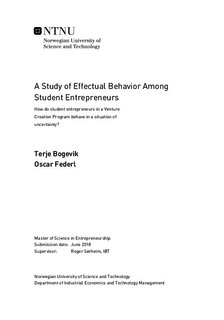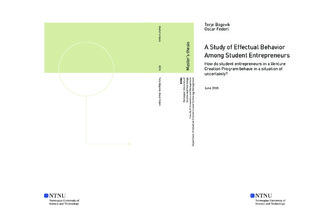| dc.description.abstract | Deciding to start a new venture is undoubtedly a risky decision. In fact, around 90 per cent of all startups fail. This high failure rate is explained by the fact that entrepreneurs launching a new venture find themselves in an environment of extreme uncertainty. This uncertainty is a product of how well the entrepreneur is suited in terms of means to pursue the entrepreneurial opportunity they have chosen. To cope with this uncertainty, entrepreneurs need to acquire new learning and new means in order to create a more predictable and manageable situation. Sarasvathy describes how expert entrepreneurs predominantly display what she calls effectual behavior in order to effectively deal with uncertainty. However, little research has been done to address whether the principles of effectual behavior are advantageous to student entrepreneurs in the same way. To find out, the authors have formulated the following research questions: 1) How do initial means affect the behavior of student entrepreneurs in a situation of uncertainty? 2) How are student entrepreneurs focusing on expanding their means through learning in order to reduce uncertainty? 3) How are student entrepreneurs displaying effectual and causal behavior in a situation of uncertainty?
To answer these questions, a qualitative approach has been taken, with a multiple longitudinal case study as research design. Four case firms have been chosen, all from the same venture creation program. The student entrepreneurs in the case firms attended the same class and were tracked for two months through semi-structured interviews. Business model development was also tracked, through the use of Lean Canvases. A cross-case analysis was then conducted in order to investigate how theoretical elements in the existing literature could explain the behavior of the entrepreneurs in a situation of uncertainty.
Out of the four case firms, two of the ventures failed during these two months. The other two were already acquiring customers and still active after the interview sessions had been concluded. These two sets differed greatly in one key variable: The two cases that failed lacked means in terms of domain knowledge and network to a much greater extent than the cases that were still operating. The findings also suggested that learning through experimentation similar to the lean startup methodology may be inefficient when the entrepreneurs lack enough domain knowledge about the industry they are trying to enter. Both findings are suggested to be pursued further with quantitative studies. | |

